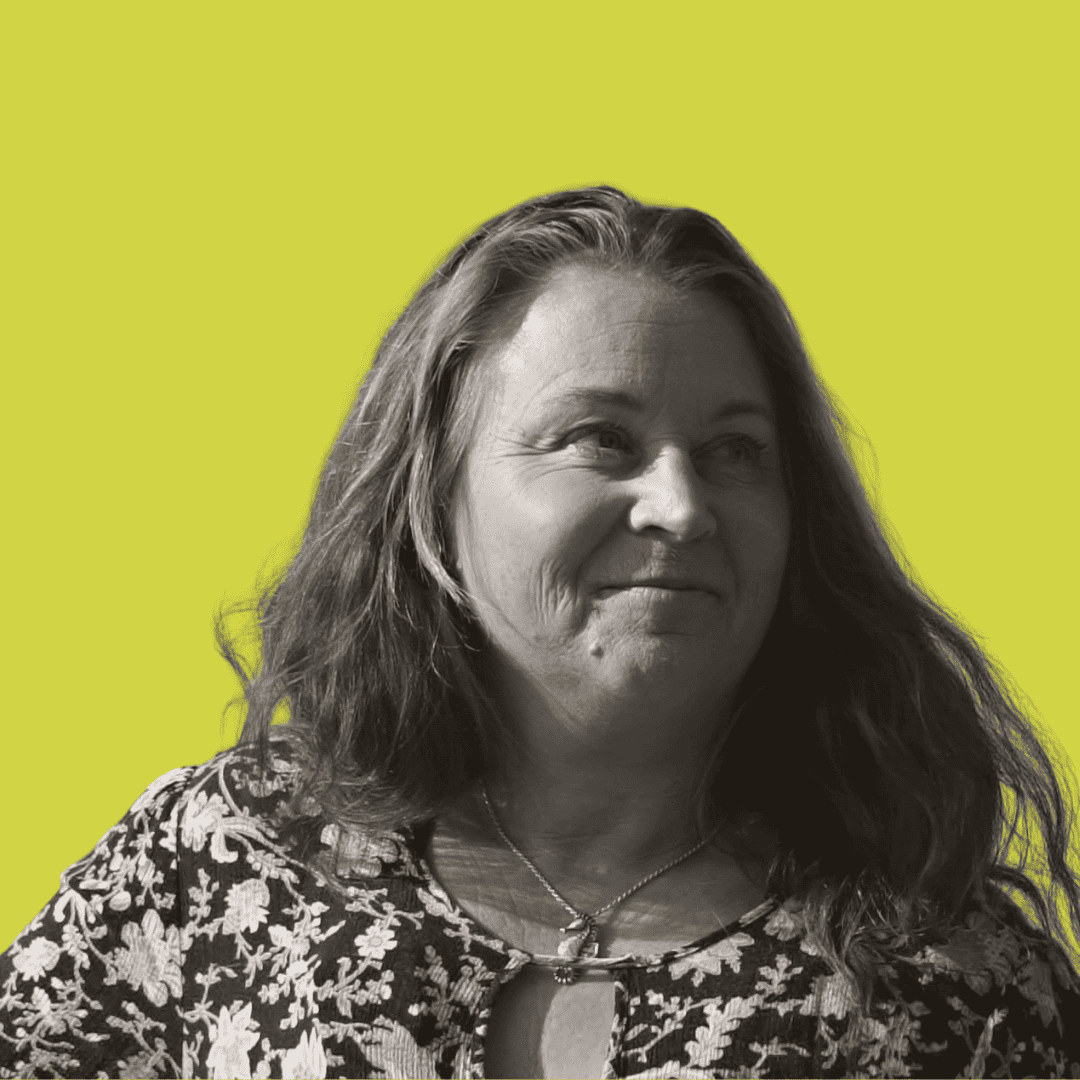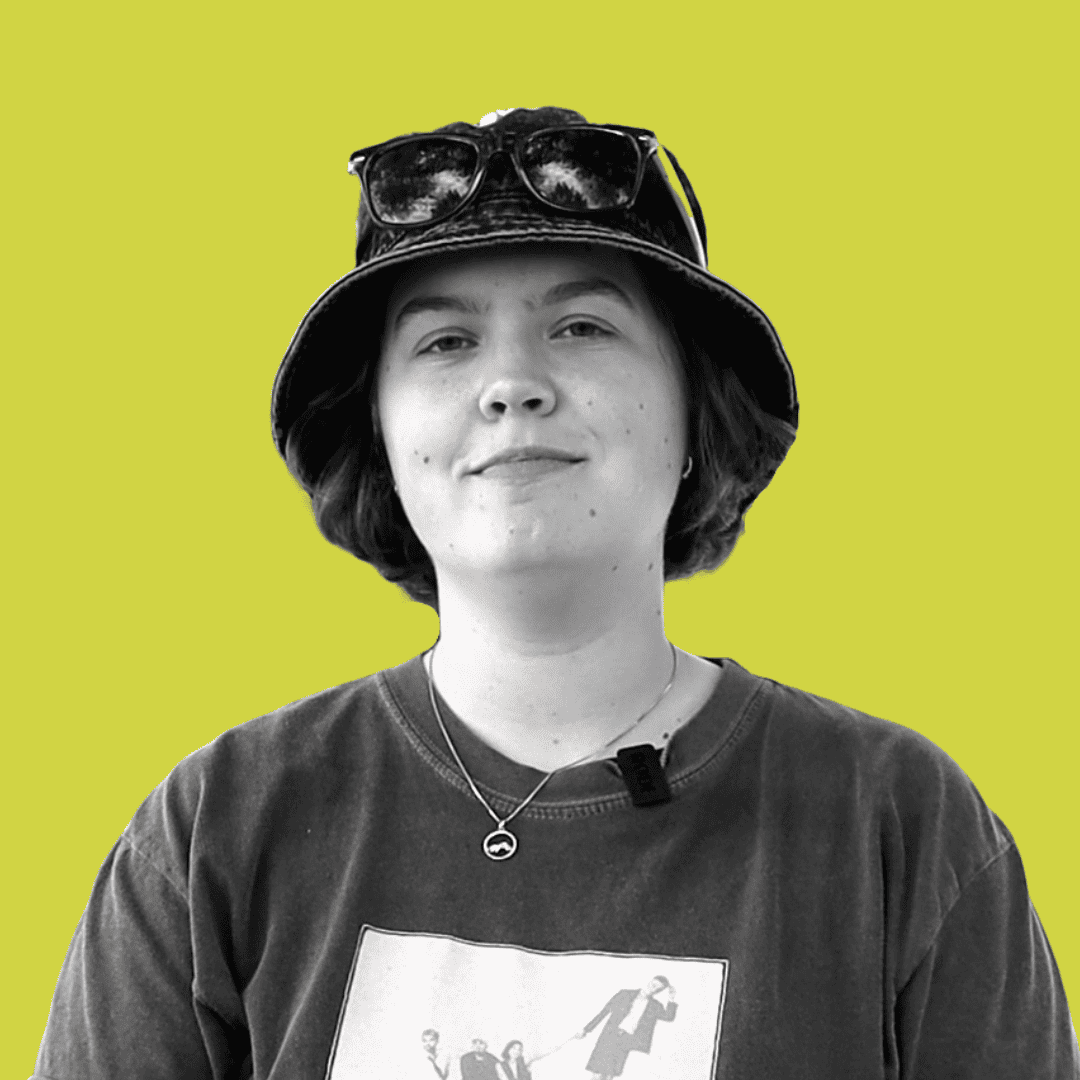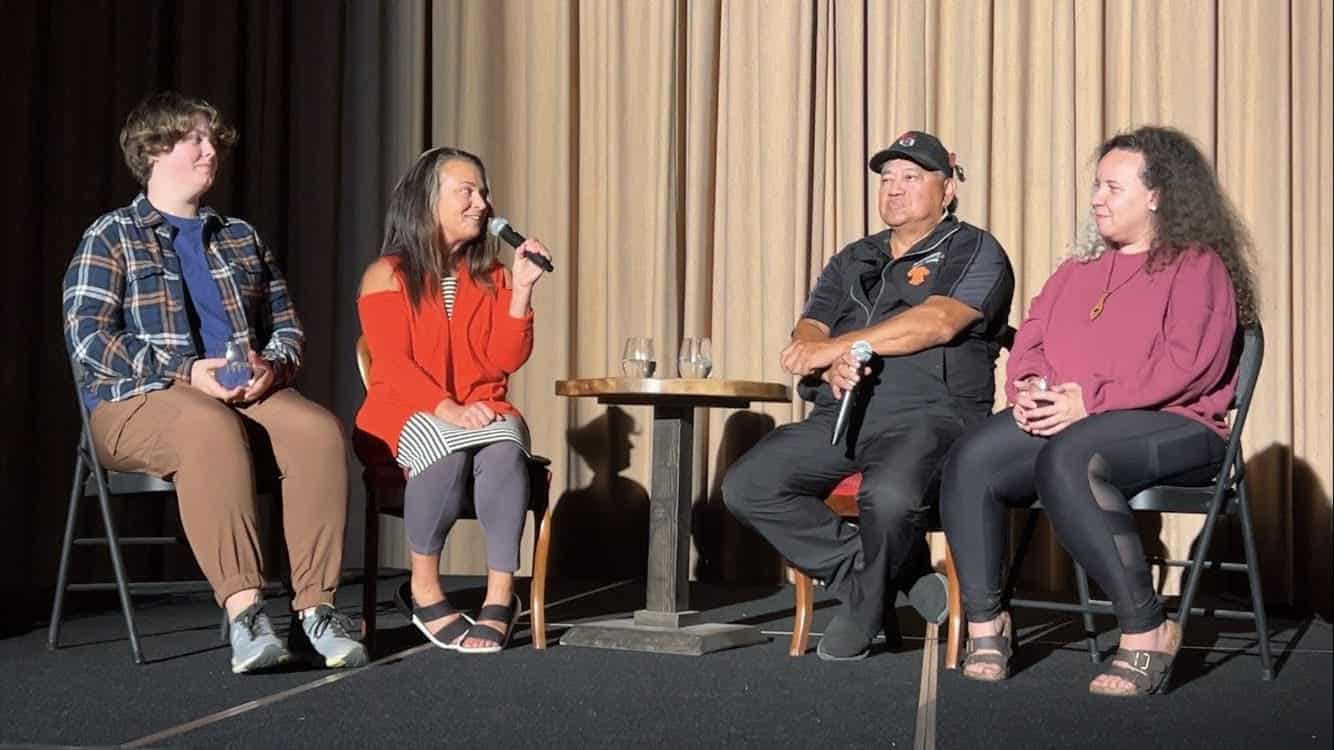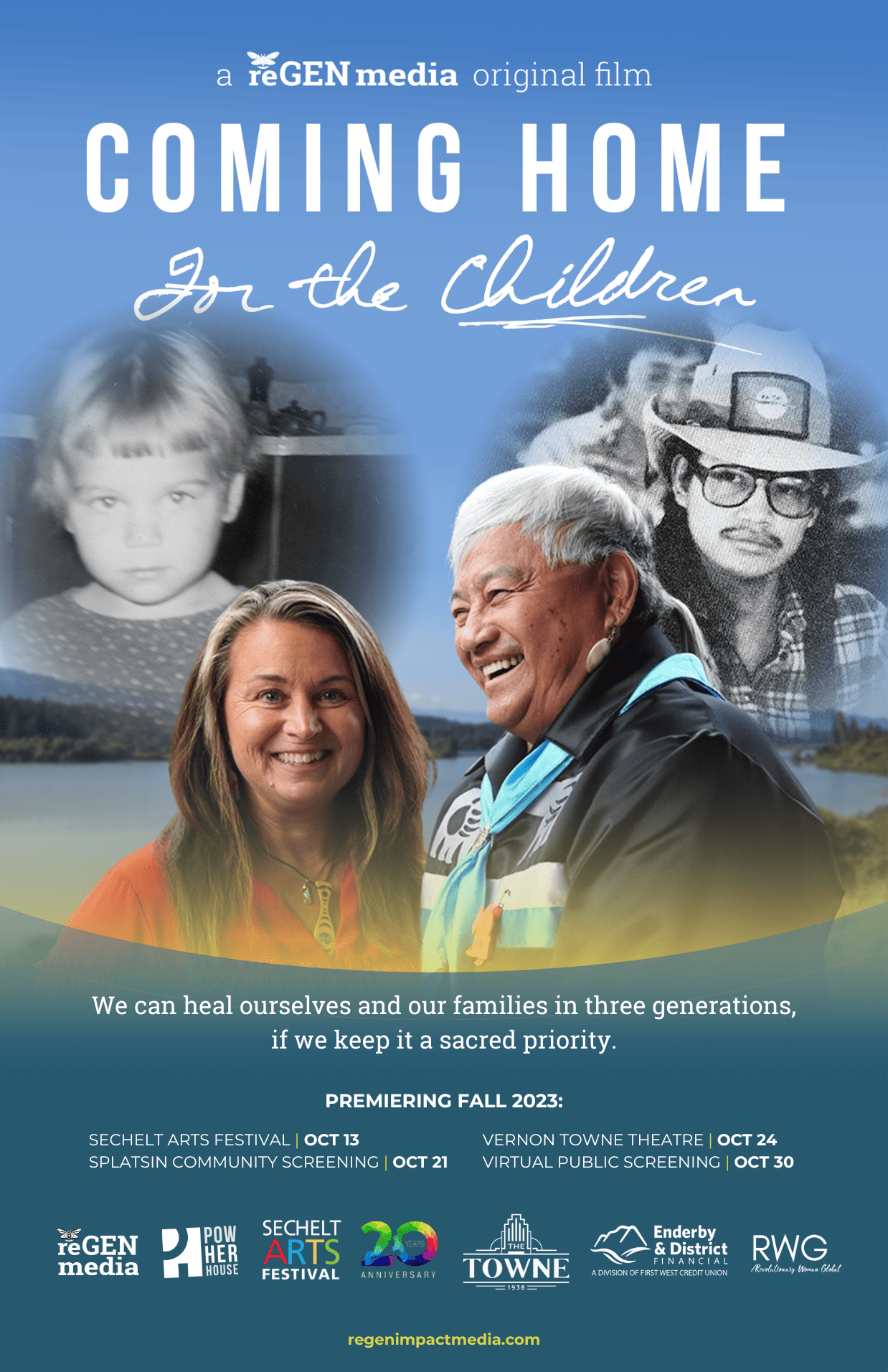Trailer
Other Media:
Film Stills
Production Photos
Credits
Featuring: Charlene SanJenko & Wenecwtsin, Wayne Christian
Director & Impact Producer: Charlene SanJenko
Co-directors & Co-producers: Willow Smith, Madeline Archibald
Cinematographer & Editor: Madeline Archibald
Assistant Cinematographer: Willow Smith
Additional cinematography by: Terran Tasci, Kelly Veltri, Anika Syskakis (Wandering Docs, RavenSpeak), Kaylyn McLachlan
Original music composed by: Ecko Aleck, Sacred Matriarch Productions | Aerial Sunday-Cardinal | Brenda MacIntyre, Medicine Song Woman
Archival images provided by: The Union of BC Indian Chiefs
Technical Info
Title: Coming Home For the Children
Genre: Short documentary
Production Year: 2023
Country of Origin: Canada
Language: English
Shooting format: Digital
Run Time: 45 minutes, 37 seconds
Aspect Ratio: 16:9
Sound Format: Stereo
First-time filmmaker: Yes
Logline
An Indigenous adult-adoptee returns to her rural home community after building an unlikely friendship with a seven-term Chief, brought together by Spirit to explore a forty-year journey of hope, healing, forgiveness, and coming home to our whole selves for the children now and seven generations into the future.
Synopsis (short)
In 1980, newly elected Chief and foster care survivor Wayne Christian led the Indian Child Caravan in a fight for Indigenous Peoples’ rights over the jurisdiction of their children. At the same time, Charlene SanJenko was 11 years old, being raised in a non-Indigenous home. She didn’t know it then, but Chief Wayne was fighting for the rights she lost as a young child in foster care.
More than 40 years later, Chief Wayne and Charlene meet for the first time and begin an unlikely friendship, exploring sacred spaces in both the Splatsin Nation and the Sḵwx̱wú7mesh Nation, and experiencing the importance of intergenerational healing, touching the pain, and what it truly means to come home to our whole selves for the children.
Synopsis (long)
Coming Home For the Children is a short documentary profiling a seven-term former First Nations Chief, Wayne Christian, and hosted by adult-adoptee and foster care survivor, Charlene SanJenko.
Filmed in the scenic valley of the Splatsin Nation, the southernmost tribe of the Secwepemc Nation in the interior of British Columbia, the film travels back and forth between two parallels: the reclaiming of the meaning of “home” for both Charlene and Chief Wayne as their meet for the first time in the Splatsin Nation; and our responsibility - as adults and parents - to intergenerational healing for the children. This was modeled by parents, grandparents, and a young Chief back in 1980 with the Indian Child Caravan led by Chief Wayne himself. The Caravan marched across British Columbia in a fight for Indigenous peoples’ rights over the jurisdiction of their children, at which time Charlene was 11 years old and unaware of Chief Wayne’s advocacy for the very same rights she had lost as a child in foster care.
As Charlene continues on her journey of reclaiming her Indigenous identity, and as Chief Wayne recounts the significant moments in his lifetime of leadership commitment for the children, the two meet for the first time and begin an unlikely friendship, which grows into a joint body of work ready to be shared with others to help our Nation heal..
We are invited to join their exploration of sacred spaces in both the Splatsin Nation and the Sḵwx̱wú7mesh Nation, experiencing the importance of intergenerational healing, touching the pain, and what it truly means to come home to our whole selves.
Cast & Crew Bios:

Charlene SanJenko
DIRECTOR, IMPACT PRODUCER, FILM PARTICIPANT
In 1969, Charlene was born in the Splatsin Band of the Secwépemc Nation, but was raised as an adopted child in a non-Indigenous home. Now 50 years later, she is on a journey to learn and reclaim her heritage, her lost childhood, and bring truth to the young Indigenous girl she never got the chance to be.
Intertwined with Chief Wayne Christian as one of the main protagonists of the film itself, Charlene brings experience in regenerative media as an impact producer to her first feature film. She hopes to bring the momentum of this documentary to other communities as part of an intentional media franchise, including a digital arts community engagement exhibition, a healing workshop series (in-person or online), and a future book written jointly by Chief Wayne and herself.

Wenecwtsin
FILM PARTICIPANT, FORMER SEVEN-TERM KÚKPI7
Wayne M. Christian is of Secwepemc ancestry. His Indian name, Wenecwtsin, from his great grandfather, means Big Voice that Speaks the Truth.
A proud father of seven children and 27 grandchildren, Kukpi7 (Chief) Wayne was elected to Council at the age of 23 and elected as Chief at 25, where he served for over 40 years in leadership.
As a child, Chief Wayne was taken from his home as a child by provincial government representatives and placed into foster care - what is now known as the “Sixties Scoop” in Canadian history. As an adult, he led two major initiatives in fighting for Indigenous rights: the Indian Child Caravan 1980 and the Constitution Express 1980 and 1981 – fighting for recognition of Indigenous laws and jurisdictions for lands, resources, and people. This is a fight he has dedicated himself to for decades - a fight that we are experiencing a full-circle moment of impact at this time.
Chief Wayne is a participant of this documentary alongside Charlene as they take a closer look at the parallel stories that intertwine them together. He believes that the children are our future, and the future is right now.

Madeline Archibald
CO-DIRECTOR, CINEMATOGRAPHER, EDITOR
Madeline is a Gen-Z digital designer, artist & filmmaker who has mastered her 10,000 hours of skills in video production - including editing, photography, composition, sound design, and publication - before the age of 25. She grew up in Golden, BC (traditional land of the Ktunaxa and Secwepemc Nations, as well as the home of the Columbia River Métis Nation) in a mountaintown community full of arts and adventures, and brings a passion to tell stories the way they deserve to be told to the creation of this film.
Madeline has brought an aptitude with a camera and a passionate editing experience to translate the story of Charlene and Chief Wayne into film format.

Willow Smith
CO-PRODUCER, ASSISTANT CINEMATOGRAPHER, AUDIO LEAD
Willow is a mixed-race Millennial whose experience in audio and video began as a hobby. She grew up in BC and now lives on the Sunshine Coast, home of the Sḵwx̱wú7mesh Nation. Now a voice actor, the co-host of her own podcast - “Loving Goliath” - and audio lead for reGEN media, she’s taken her hobby to a whole new level under the umbrella of reGEN and The Goliath Foundation.
She brings audio expertise, an eye for detail, and a producer's hat in the production of Coming Home For the Children, including producing an accompanying podcast to the film, “Coming Home: In Conversation with Kukpi7 Wayne Christian”, which features additional audio footage from both Charlene and Chief Wayne to add to the depth of this film.





















